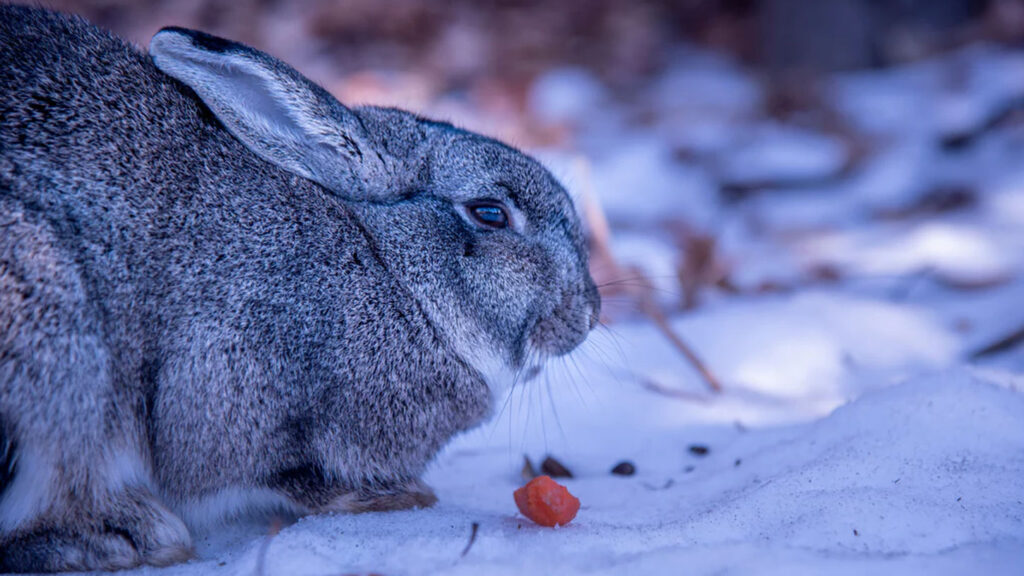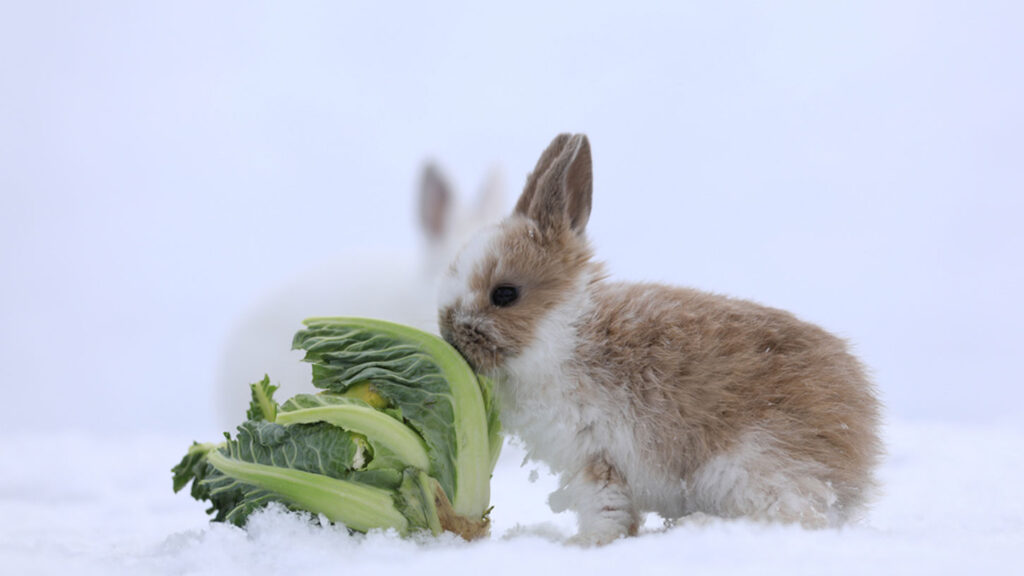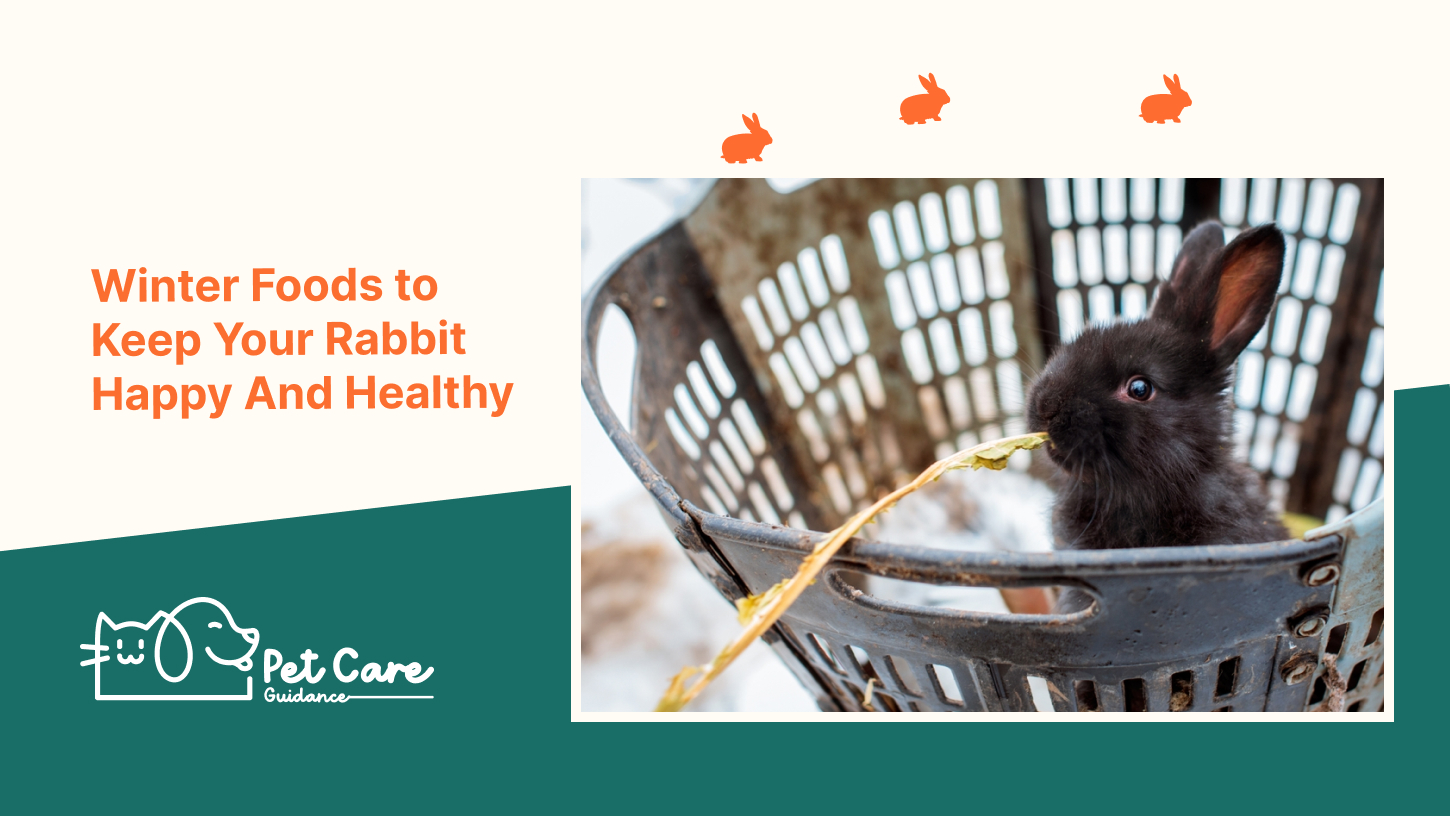Winter Foods to Keep Your Rabbit Happy And Healthy include feeding hay, special orchard hay, alfalfa hay, and meadow hay, as they are greener, fresher, and more nutritious for rabbits. Mesh doors can be covered with clear Perspex or plastic to protect them from rain and wind, while moving their home into a shed or unused garage can help keep them warm.
Additionally, providing fresh drinking water, good quality hay and grass, leafy greens, and a small amount of pellets will ensure a balanced and healthy diet for your rabbit during the winter months.
Choosing The Right Winter Foods For Your Rabbit
Rabbits require a balanced diet to maintain their health and happiness throughout the winter months. When selecting winter foods for your rabbit, there are a few factors to consider. First, it’s crucial to choose hay that is high quality and fresh. Hay makes up a significant portion of a rabbit’s diet, providing them with essential fiber.
Additionally, seasonal greens such as watercress, Brussels sprouts, and leafy vegetables can be included to provide variety and additional nutrients. It’s important to avoid foods that are harmful to rabbits, such as avocado and garlic. Providing fresh water and ensuring your rabbit’s living space is warm and protected from the elements are also essential for their well-being.
By carefully selecting winter foods, you can keep your rabbit happy and healthy throughout the season.
Essential Winter Foods For Rabbits
When it comes to keeping your rabbit happy and healthy during the winter, hay is an essential component of their diet. It serves as the backbone of their meals, providing them with necessary fiber and nutrients. Orchard hay is a special treat that can add variety to their meals, while meadow hay offers a fresh and nutritious option. Leafy greens are another important aspect of a rabbit’s winter diet, providing them with additional vitamins and minerals.
It is important to ensure that your rabbit has access to fresh and clean water at all times. By offering these essential winter foods, you can ensure that your rabbit stays happy and healthy throughout the colder months.

Avoid These Winter Foods For Your Rabbit
When it comes to keeping your rabbit happy and healthy during the winter, it is important to be mindful of what foods to avoid. One such food is avocado, which can be dangerous for rabbits. Another item to avoid is iceberg lettuce, as it has limited nutritional value for rabbits.
Additionally, garden rhubarb should be kept away from rabbits as it is toxic to them. Garlic is also harmful to a rabbit’s digestive system and should not be included in their diet. Instead, focus on providing your rabbit with foods that are safe for them to eat, such as celery, apple, banana, and blueberry.
It is also important to ensure that your rabbit has access to hay, watercress, Brussels sprouts, cabbage, cauliflower, and leafy vegetables, as these are some of the best foods for rabbits. By being mindful of what foods to avoid and providing a well-balanced diet for your rabbit, you can ensure their happiness and health during the winter months.
Human Foods That Are Safe For Your Rabbit
Celery: A Crunchy and Hydrating Snack
Apple: High in Fiber and Vitamins
Banana: A Sweet Delight for Rabbits
Blueberry: Packed with Antioxidants and Fiber
Providing Proper Winter Shelter For Your Rabbit
|
Providing Proper Winter Shelter for Your Rabbit Mesh doors can be partially covered with clear Perspex or plastic, to help protect your rabbits from rain and wind, whilst allowing them to see out. Moving your rabbits’ home into a shed, outhouse or unused garage is a good way to help them keep warm. |
|
Ensuring a Cozy and Insulated Environment for Your Rabbit’s Well-being During winter, it is important to make sure that your rabbit’s enclosure is cozy and insulated to keep them warm and comfortable. Consider adding extra bedding such as straw or hay for insulation. You can also use thermal covers or blankets to further protect your rabbit’s living area from the cold. Regularly check for any drafts or leaks in the enclosure and seal them to maintain a warm environment for your rabbit. |

Feeding Wild Rabbits In The Winter
During the winter season, it’s crucial to provide food for wild rabbits as it plays a significant role in their survival. With limited natural resources available, **providing suitable food options for wild rabbits** becomes essential. While human intervention is necessary, it’s important to balance it with wildlife conservation. **Hay**, such as orchard hay, alfalfa hay, and meadow hay, is one of the best foods for rabbits in the winter.
Feeding hay that is greener, fresher, and more nutritious than regular hay is highly recommended. When considering what to feed rabbits in the winter, it’s important to ensure they have access to fresh, clean drinking water, as dehydration can be a significant issue for rabbits. Additionally, **supplementing their diet with leafy greens** and a small amount of pellets can provide the necessary nutrients.
While providing food for rabbits in the winter is crucial, it’s equally important to ensure their shelter is suitable and protected from harsh weather conditions, such as rain and wind. To keep rabbits warm in winter, **consider partially covering mesh doors** with clear Perspex or plastic to provide protection while still allowing visibility.
Alternatively, moving their living space into a shed, outhouse, or unused garage can help provide warmth. Taking these measures helps prioritize the well-being and health of wild rabbits during the winter season, ultimately contributing to their happiness and overall survival.
Taking Care Of Your Rabbit’S Winter Health
Winter can be a challenging time for rabbits, but there are steps you can take to keep them happy and healthy. One important aspect of rabbit care during winter is protecting them from the cold weather conditions. Providing additional bedding and insulation can help keep them warm and comfortable.
Make sure to regularly check for any health issues through vet check-ups and monitoring. This proactive approach ensures that any potential health problems are caught early on. By taking these precautions, you can ensure that your rabbit stays happy and healthy throughout the winter season.
Frequently Asked Questions Of Winter Foods To Keep Your Rabbit Happy And Healthy
What Do You Feed Rabbits In The Winter?
Feeding hay is essential for rabbits in winter. Choose rabbit pellets with orchard, alfalfa, and meadow hay. It’s greener, fresher, and more nutritious for them. Make sure they have access to fresh water, and consider adding leafy greens and a small amount of pellets as a supplement to their diet.
Should I Put Food Out For Rabbits In The Winter?
In the winter, it is best to provide rabbits with hay. Feeding them hay that contains orchard, alfalfa, and meadow hay is more nutritious and fresher than regular hay. This helps to keep them happy and healthy during the winter season.
What’S Best To Keep Rabbits Warm In Winter?
To keep rabbits warm in winter, you can partially cover mesh doors with clear plastic to protect them from rain and wind. Moving their home into a shed or garage also helps. Provide fresh hay, grass, and water as their main diet, with some leafy greens and pellets as supplements.
How Do You Take Care Of A Rabbit In The Winter?
To take care of a rabbit in the winter: 1. Feed them hay, specifically orchard, alfalfa, and meadow hay for nutrition. 2. Provide fresh, clean drinking water. 3. Supplement their diet with leafy greens and a small amount of pellets.
4. Protect their habitat from rain and wind by partially covering mesh doors with clear plastic. 5. Consider moving them indoors to a shed, outhouse, or unused garage for warmth.
Conclusion
To keep your rabbit happy and healthy during the winter, it is important to provide them with the right foods. Prioritize feeding hay, specifically orchard hay, alfalfa hay, and meadow hay, as it is greener, fresher, and more nutritious for rabbits.
Alongside a diet of hay, supplement with leafy greens and a small amount of pellets. By ensuring that your rabbit receives a high-fiber diet, you can prevent digestive problems and maintain their well-being throughout the winter season. Remember to always prioritize their health and provide them with fresh, clean drinking water as well.


